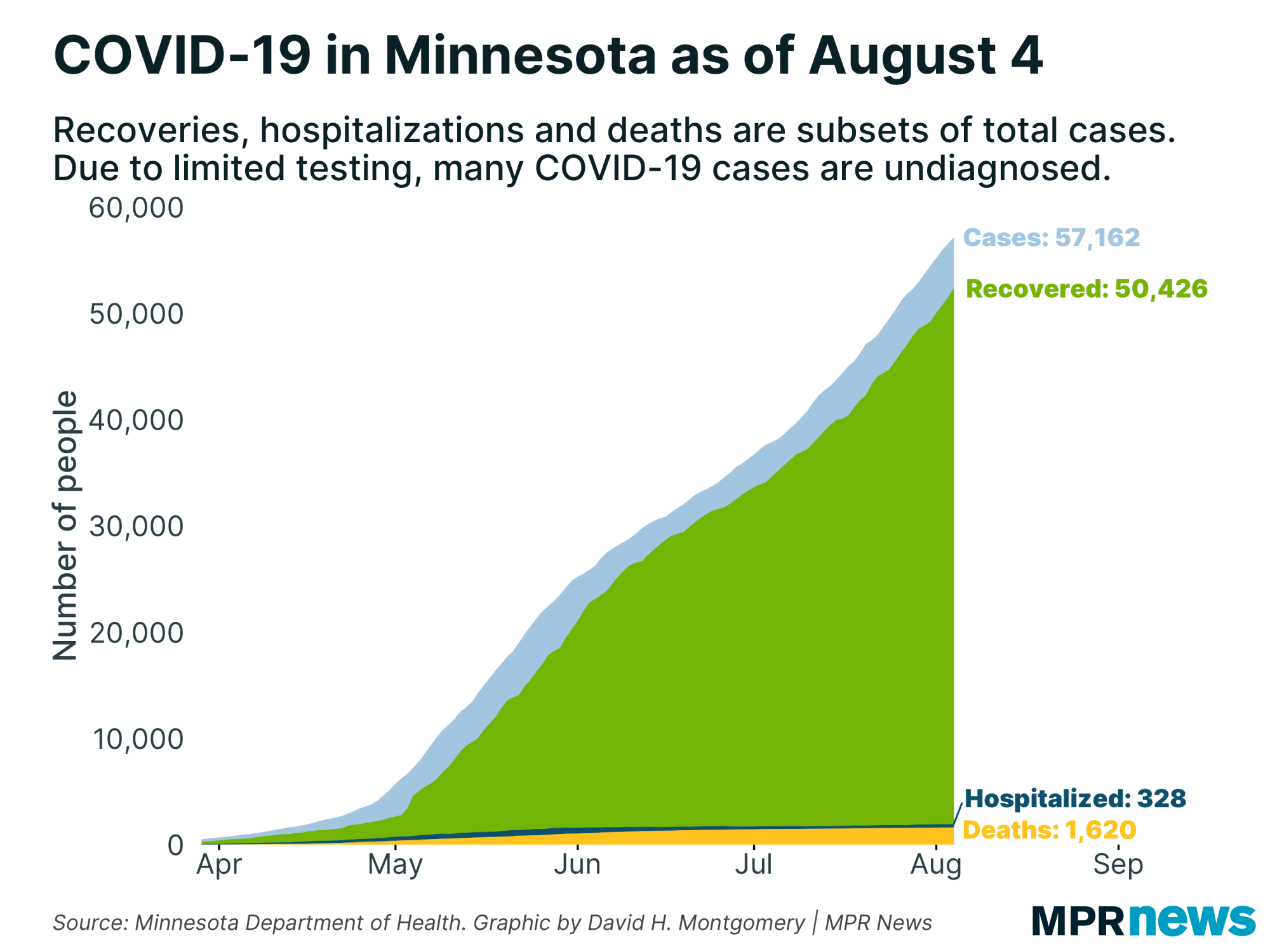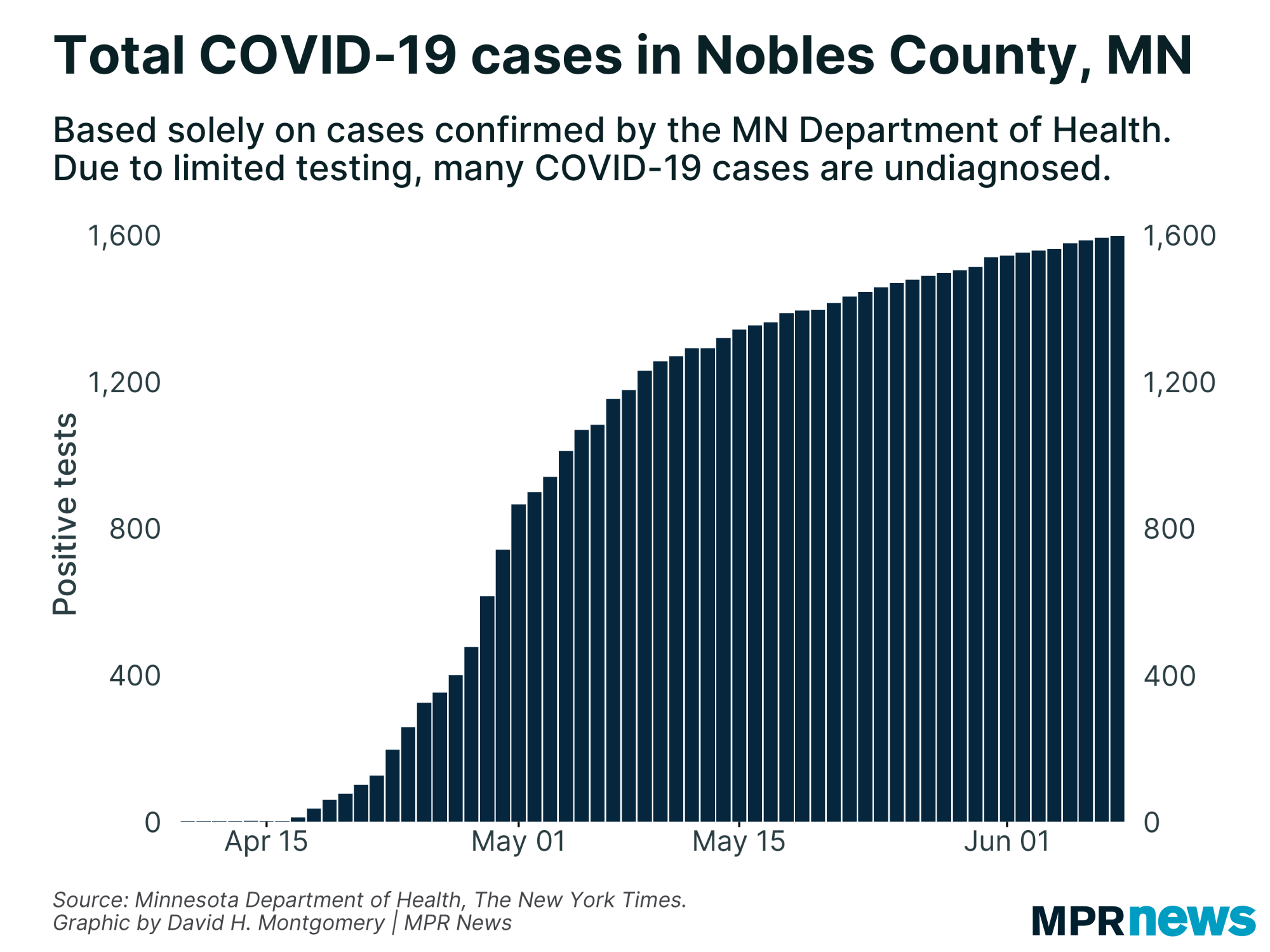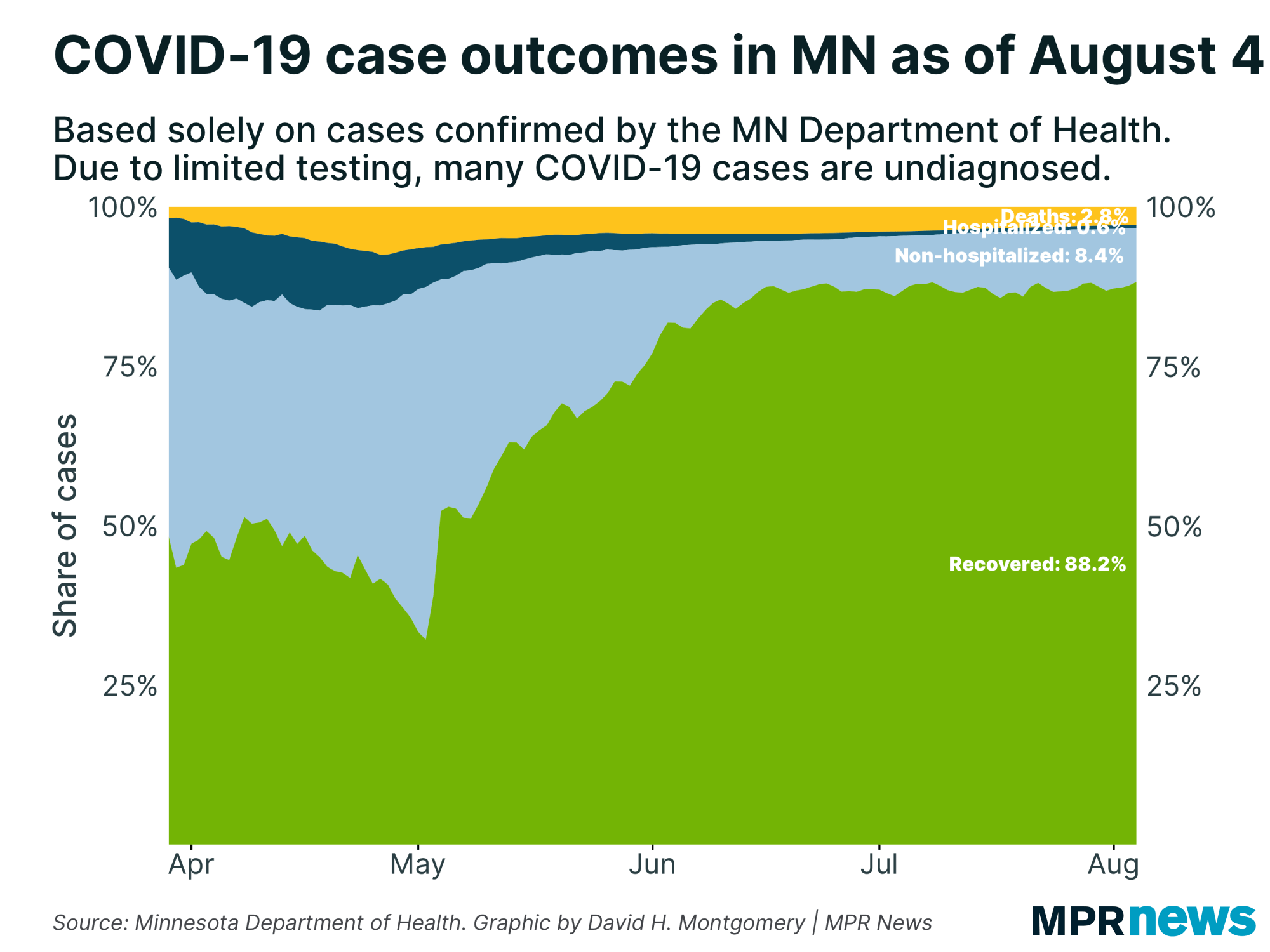May 4 update on COVID-19 in MN: 428 deaths; bars, eateries suffer 'monumental hit'

Go Deeper.
Create an account or log in to save stories.
Like this?
Thanks for liking this story! We have added it to a list of your favorite stories.
Updated 5:42 p.m. | Posted: 5 a.m.
Reeling from weeks of economic fallout from COVID-19, Minnesota’s restaurant, resort and lodging industries are facing a flood of business failures if conditions don’t improve soon.
“We know from our recent survey that more than half these businesses face certain, permanent closure in the next two months on the current course,” Liz Rammer, CEO of the trade group Hospitality Minnesota, told reporters during Gov. Tim Walz’s Monday briefing on the pandemic’s medical and economic toll.
She said that while her members understand the need to check the spread of the disease, they’ve taken a “monumental hit” the past six weeks. “We’re confident,” she said, “that our hospitality businesses are ready to open now. Our businesses and the public are ready to approach this new new normal.”
Walz on Monday reiterated the need to balance public health with the need to restart more sectors of the economy. “This is the question that's vexing everyone." He did not give a date as to when restaurants and bars could start letting people dine in.
Turn Up Your Support
MPR News helps you turn down the noise and build shared understanding. Turn up your support for this public resource and keep trusted journalism accessible to all.
Deaths, hospitalizations, case counts rise
Rammer’s comments came hours after the state Health Department reported that Minnesota deaths tied to COVID-19 rose to 428, up nine from Sunday, as current hospitalizations (396) and intensive care cases (166) also hit new highs.
The number of confirmed cases continued to jump as the state’s program to test for the disease accelerated — 7,234 Minnesotans tested positive since the pandemic began, up 571 from Sunday.
The daily rise in deaths was the smallest in two weeks, although that may be a function of variations in record keeping and reporting.
“It was a pretty rough April,” the governor conceded at one point.
One hopeful note: Of Minnesota’s total COVID-19 cases, about 58 percent of those patients have recovered to the point they no longer need to be isolated. That recovery percentage had fallen last week to around 40 percent as case counts leaped.

More Minnesotans back on the job
While the uncertainty continued for bars and restaurants, the state on Monday lifted some restrictions on retailers that could put as many as 30,000 Minnesotans back on the job; bars and restaurants, however, remain takeout-only until May 18.
Walz’s tweaked stay-at-home order lets retailers and other businesses offer curbside pickup of purchases.
Walz on Monday said that about 91 percent of Minnesota’s workforce is now able to return to their workplaces with hygiene and distancing rules in place. Restaurants and bars remain the biggest sector still unable to bring customers back into their buildings.
Rammer made it clear the breaking point is approaching.
"Reopening won't be sufficient,” she said. “These businesses really need an extra hand up.”
For those that do survive, it will still take time for them to order food and get ready to open. “The coolers have been empty for some time,” she said, emphasizing that business owners want certainty on when they can open.
Walz said he could not yet give dates for the next round of business reopenings. "I don't have an exact date … the sooner you can get certainty, the better."
Central, SW Minnesota outbreaks tied to meatpacking
As testing accelerates, more cases are discovered. The hot spots in Minnesota are increasingly centering on food processing plants.
About 25 percent of the 1,000 new cases over the weekend came from five counties that have seen outbreaks in food processing plants, Minnesota Health Commissioner Jan Malcolm said Monday.
Cases in Nobles County in southwestern Minnesota, where an outbreak centered around the massive JBS pork plant in Worthington, continue to mushroom. Nobles remains the largest outbreak outside the Twin Cities and the largest by far of any Minnesota county relative to its population.
Confirmed cases in the southwestern Minnesota County have jumped from a handful in mid-April to 1,011 on Monday as testing in the region accelerates, revealing more cases. That’s about 1 in 20 people in the county confirmed infected.

The JBS plant shut on April 20 as executives worked to control the disease’s spread. The union representing workers at JBS said Sunday that it's been told the facility will reopen on Wednesday. In a statement, union leaders said workers will be spaced farther apart and the plant will expand cleaning and disinfecting.
The closure of the plant and others in the Midwest has caused major disruption in the supply chain, with some hog farmers forced to kill healthy pigs because there was no place to process them.
Similar problems were reported in Stearns County, where COVID-19 cases tied to two packing plants — Pilgrim’s Pride poultry plant in Cold Spring and Jennie-O Turkey in Melrose — have skyrocketed. An undisclosed number of workers at both plants have tested positive for the virus.
At the beginning of last week, there were 55 confirmed coronavirus cases in Stearns. By Sunday, as testing for the disease intensified, there were 589 and by Monday confirmed cases had jumped again to 728.
Kandiyohi County in west-central Minnesota is also seeing cases jump two weeks after officials with the Jennie-O turkey processing plant there said some employees had tested positive for the coronavirus. The county had confirmed three COVID-19 cases back then. On Monday, the Health Department reported 188 people in Kandiyohi County have now tested positive.

Political pushback rises
Republicans are pushing back harder against the governor's stay-at-home order heading into its eighth week, with two more weeks to go. Last week, House Minority Leader Kurt Daudt, R-Zimmerman, threatened to stop a public works funding bill until Walz’s executive orders were lifted.
Senate Finance Committee Chair Julie Rosen, R-Vernon Center, said in a Facebook post over the weekend that Walz’s restrictions on daily life have gone too far.
“I think this is going to really show an adverse effect not only in our state budget, but in our prosperity throughout the state, and to the mental health situation for many people,” she said.
Senate Republicans are also bringing small business owners to the Capitol Monday to talk about the impact that COVID-19 restrictions are having on them, and what they’d like to see changed about the stay-home order.
Walz on Monday expressed hope that a public works package can still get done. “There’s strong bipartisan support to do this,” he said. “These are projects that are going to be needed, not just for job creation but for the vitality" of the communities nearby.
With two weeks to go before the state Legislature must adjourn its session, lawmakers will receive a budget update Tuesday from the state finance agency amid widespread belief a deficit is ahead. It is rare for an assessment of this kind to be done, but the unparalleled circumstances led to it.
Close to home, even for fishing opener
The governor lifted restrictions on boating a few weeks ago, but even as Minnesotans prepare for the open water fishing opener next weekend, officials are continuing urging people to stay close to home.
There’s been an ongoing worry that Minnesotans could unknowingly spread the virus to small-town Minnesota and overwhelm rural health systems.
"Even with the fishing opener coming up, staying close to home, enjoying those outdoor activities, but doing so with a minimum of travel is what is advised from a health perspective,” Malcolm told reporters. “We have to keep on keeping these good behaviors.”
Developments from around the state
Boundary Waters reopening for day use
The Boundary Waters Canoe Area is opening for day use on Tuesday but will remain closed to overnight paddlers through May 17.
The Superior National Forest said that's to align with the state's stay at home order and Gov. Tim Walz's request to recreate close to home. Those who made overnight reservations through May 17 will receive a full refund.
The cancellation of overnight permits is a blow to canoe outfitters in northern Minnesota that provide gear and food to people entering the wilderness. But the Superior National Forest said allowing day use provides some opportunities for local recreation and businesses.
Bill Forsberg, who operates Timber Trail Lodge and Boundary Waters Outfitters outside Ely, Minn., said his customers are frustrated but understanding.
"People still want to come, and so far most of our customers are willing to just hang on to their permit in hopes that they can come,” he said. “But, groups in June are now starting to get nervous, let alone the ones in May."
Forsberg said he lost several thousand dollars in reservations for the next two weeks.
Meanwhile, the National Park Service says Voyageurs National Park will also be closed to overnight use through May 17. Quetico Provincial Park across the Canadian border from the Boundary Waters remains closed until the end of May.
— Dan Kraker | MPR News
Fargo testing event canceled due to supply shortage
A COVID-19 testing event scheduled for Monday in Fargo, N.D., was canceled due to a lack of testing supplies.
The outdoor drive-up event was scheduled to take place Monday afternoon at the Fargodome. Fargo Cass Public Health announced it was obliged to cancel the event due to a shortage of testing supplies at the North Dakota Department of Health microbiology lab.
In his daily briefing, Gov. Doug Burgum explained that a glitch in the testing supply chain left his state lab without a key component.
"Today, we did run into a shortage of deep well plates on our Thermo Fischer testing machine — this unit has 19 different consumable pieces that must be on hand to run one test,” he said.
Burgum attributed the shortage to competition with other states as well as federal agencies. He said the lab has since acquired 100 new deep well trays from North Dakota State University. Each tray holds 96 tests for processing.
— Marianne Combs | MPR News
Deal on elective surgeries, dental work expected Tuesday
The governor had put a hold on elective surgeries and nonemergency dental procedures over the past weeks to preserve crucial protective gear and equipment needed to respond to a surge in COVID-19 cases. On Thursday, he said that hospitals, so far, have enough gear to handle the cases.
On Monday, he said he expected an announcement Tuesday that will allow doctors, hospitals and dental clinics to return to that work.
— MPR News Staff
Walz order temporarily stops wage garnishing for debt
Walz on Monday signed an executive order exempting federal, tribal, state, and local COVID-19 relief funds from being automatically intercepted by creditors and debt collectors.
Walz in a statement said the order “will help alleviate the financial burden Minnesotans are facing, allowing them to pay rent and put food on the table.”
The governor said the order doesn’t suspend payments for child or spousal support.
— MPR News Staff
MN Senate backs $20M to boost internet access
The Minnesota Senate on Monday voted to spend $20 million to provide greater access to high-speed internet in an age of distance learning and telemedicine.
The bill would set up a special grant program for districts that needed to shore up internet availability while schools are closed due to COVID-19. Sen. Torrey Westrom, R-Elbow Lake, said it's a matter of educational fairness.
“For students that have to drive 20 and 30 minutes from home to go sit in their car to do homework outside their school just so they can get Wi-Fi or high-speed Internet access or go sit at the McDonald's if they have one close.”
Additional money was put into a border-to-border broadband account to assist areas that aren’t served or are underserved. A House plan would spend even more on the high-speed grants. The two proposals could be reconciled in the weeks ahead.
— Brian Bakst | MPR News
Colleges start holding online commencements
With statewide stay-at-home orders still in effect, some Minnesota colleges have chosen to hold virtual commencement ceremonies.
Hundreds tuned in to watch Concordia College in Moorhead stream its online commencement ceremony on Sunday.
Graduating senior Elly Schaefer addressed her fellow students from a podium without an in-person audience:
“No matter where each of you are right now, whether you are alone, with family or with roommates, I guarantee it’s not where you thought you would be for your graduation," she said. "In addition to feeling excited about graduating from college, today I also feel sad and lonely. And I imagine that’s the same for many of you.”
After the commencement addresses, the college scrolled the names of each graduating student on the screen, along with their hometown and field of study.
Other Minnesota colleges have also opted to hold graduation ceremonies online, including Winona State, which is holding its digital commencement ceremony later this week.
— Elizabeth Shockman | MPR News
Data suggest more people with stroke symptoms aren’t seeking care amid pandemic
The Minnesota Department of Health says recent findings suggest some people suffering from stroke symptoms are avoiding going to the emergency room out of fear of exposure to the coronavirus.
Dr. Al Tsai is an epidemiologist with the health department. He said their analysis shows the monthly average for stroke patient visits at Twin Cities hospitals was down about 15 percent in March.
"It's a great concern because if people are not coming in to get treated and seek care, they run the risk of much greater disability and even risk of death from strokes," he said.
The department says the same warnings apply to those experiencing symptoms of a heart attack; they say people with those symptoms should seek medical care.
Health officials in several parts of the country are reporting similar declines in ER visits for non-COVID-19 cases.
— Mike Moen | MPR News
Top headlines
Republicans push Walz to speed up business reopenings: DFL Gov. Tim Walz says he’s working on reopening more businesses that were closed amid COVID-19 concerns, but he’s not sure when it will happen. Senate Republicans say the governor needs to move faster or those businesses will disappear.
COVID-19 damage to state budget assessed this week: Months ago, lawmakers were debating how to spend extra money. This week, state leaders learn if they’ll have to confront a deficit instead.
Today’s grads carry dreams of a bright future into a dim jobs market: Most everyone in the class of 2020 is getting a continuing education course, courtesy of the College of Hard Knocks. Finding your first job out of college during an economic meltdown is challenging. Advisers suggest focusing on the sectors of the economy that are hiring. And trying not to panic.
Making radio with young children at home: MPR News journalists are still reporting, mostly from home during the pandemic. Those who are parents are now doing that work, like so many others in Minnesota, with small children around.
Native nonprofit expands Minnesota farm, aims to scale up crop production amid pandemic: Dream of Wild Health has expanded its farm in Hugo, from 10 to 30 acres, and they plan to scale up production as they work to prepare the newly acquired land, which was previously conventionally farmed, for organic farming.
As pandemic closes doors, Minnesota creamery charts path to open new ones: As the coronavirus pandemic continues to disrupt various supply chains in Minnesota, some farmers and small business owners are getting creative and adapting to the changing conditions. In some cases, a major pivot has opened new doors in getting products to the masses.
COVID-19 in Minnesota
Health officials for weeks have been increasingly raising the alarm over the spread of the novel coronavirus in the United States. The disease is transmitted through respiratory droplets, coughs and sneezes, similar to the way the flu can spread.
Government and medical leaders are urging people to wash their hands frequently and well, refrain from touching their faces, cover their coughs, disinfect surfaces and avoid large crowds, all in an effort to curb the virus’ rapid spread.
The state of Minnesota has temporarily closed schools, while administrators work to determine next steps, and is requiring a temporary closure of all in-person dining at restaurants, bars and coffee shops, as well as theaters, gyms, yoga studios and other spaces in which people congregate in close proximity.


